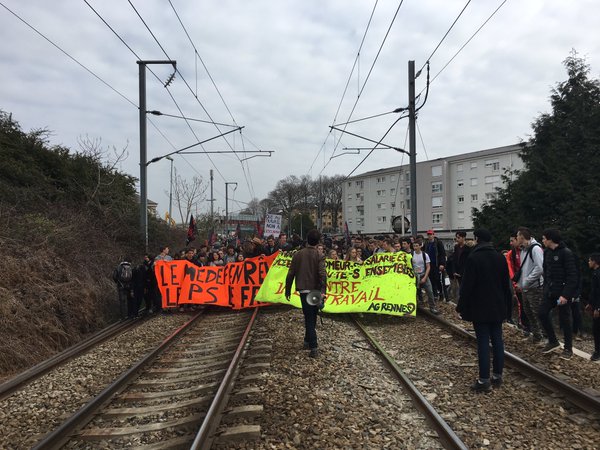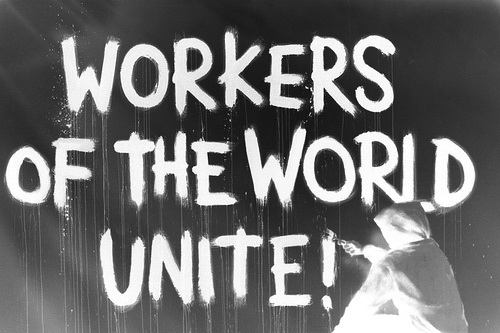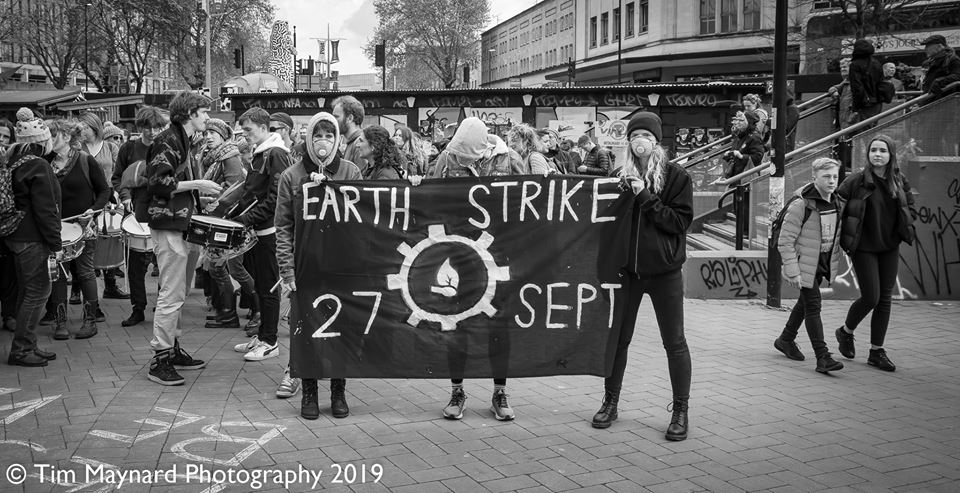Plan C has an ongoing commitment to the social strike as a strategic and theoretical orientation. This interview attempts to explore some of the ‘big ideas’ in the background of the concept, and speculate on some of the potential ways forward for the theory and praxis of the social strike.
The interviewer is Callum Cant of Plan C Brighton, the interviewee is S.W. of Plan C Thames Valley.
You’ve made the argument to me before that if we genuinely follow the Copernican inversion and accept that class struggle drives capitalist development, then the decomposition that followed the neoliberal counterrevolution may have produced capitalism’s developmental problems today. Whilst there is struggle that is live and moving in the global south, in the global north capitalism has cannibalised its own motor. Do you want to elaborate on that?
Exactly that. The forces that were at play in the 1970s obviously destroyed the collective power of the mass industrialised working class to broker deals effectively in the global north, the spatial and technological transitions that emerged out of the crisis of ‘managing’ European labour resulted in the colossal reorganisations of globalisation. These developments were uneven, and set the stage for a new period of struggle in the global south constituted on a very different technological, productive and economic basis. So the struggles developing in the global south are not history repeating itself, it isn’t the long struggle of industrialisation that occurred during the 19th century in Europe, instead we’re seeing a very accelerated process of technological and organisational change in response to worker militancy.
So in China, for example, you have already seen a transition from ‘workshop of the world’ to capital flight, deindustrialisation and automation.
Exactly. The major negative impact of this has been to scramble the long held certainties of the radical left, both in its capacity to understand and place itself within the world but also in its capacity to develop appropriate forms of strategy adequate to present conditions. That’s been more than evident in the global north for some time, where we’ve witnessed radical groups advocating strategies that belong to previous cycle of struggles, when the class was composed differently and could more easily broker bargains with capital – or even force its own agenda. In fact many of these groups now act like historical re-enactment societies. But it’s obvious to anyone with an eye on the present, that these strategies no longer apply given the current composition of the class existing in the global north; conversely it’s also a fantasy to assume that these strategies could be applied to the global south in the way they once were here.
China’s GDP, for example, which until recently was the ‘run away’ success story of global capital. Unlike the European past, China’s GDP growth was not reflected in an expansion of the industrial proletariat, or at least for a time did not seem contingent- as levels of industrial workers continue to decrease replaced via automation. As such a ‘ secular crisis’ in the functioning of capital is now evident- and here we see all the classical arguments about ‘falling rate of profit’ etc – but with no correlate collective capacity to break through it using traditional forms of workers’ struggle.
If we buy the analysis set out in operiasmo and later autonomia, then it should also have a causal predictive capacity. If we can see in the events of the recent labour history within Europe, the agency of workers struggle to dictate capitalisms development, therefore we could potentially apply strategies that would drive capital’s responses to struggle in order to benefit the ‘workers’ movement. If, that is that operiasmo, contains ‘ universal truths’ vis a vis class struggle/capital development.
My anxiety is that operiasmo may have only been useful for describing the relation between capital and labour in the period in which it was formulated- between the late 1950s and 1970s. i.e the transition from formal contract capitalism and total subsumption, that ironically no longer guarantees one access to a wage.
Can we develop strategies and ideas to test the contemporary viability of operiasmo’s insights?
One concept that operiasmo prioritised was an analysis of class composition, so it seems to me we’re moving towards asking questions about subjectivity. What we’re really asking is if operiasmo can survive after the death of the operia massa [mass worker]. But this leads us to the pitfall of so much autonomism: endlessly naming new subjects and proposing new compositions – be it the multitude or whatever.
What is interesting about the social strike, is that it follows an emphasis within analyses of composition that frames subjectivity as an open question. If there is a revolutionary subject, it can’t just be divined from the pure truth of the class, but also needs to be created.
So I was wondering about what you think about subjective production in the process of the social strike. Is it a possibility and, if so, what kind of subject are we interested in producing?
The social strike is a roll of the dice, a political wager. It’s premised on a recognition (by a certain subsection of the radical left) of the role of class struggle in the process of capitalist development and ultimately in its destruction. It’s also premised on the acknowledgement that the traditional forms of workers’ power which delivered our class victories during the last half century no longer seem viable. For anarchists and marxists of the last century, the ‘working class’ or to be more precise, the industrial worker identity, was an avatar for the injustice they witnessed in society, that simultaneously presented them with an agency for revolution, as both tendencies saw the activity of working class as essential in capitalisms overthrow. The worker identity also acted as a universal figure around which to organise in the hope of creating a ‘better life’ for all on the other side of capitalism. The possibility of a universal and more socially equitable life for everyone, continues to motivate revolutionaries. While the universal figure of the industrial proletarian was perhaps always unrepresentative of the depth and scale of differences expressed with the labouring masses , it was none the less a foil around which revolutionaries could hang their hope. How then can the contemporary left find unity (social solidarity) between the multiple identities and differences of contemporary society?
Now it should be obvious that my rejection of a universal worker identity (premised on work carried out at sites of mass industrial production) does not mean that I reject work place organising, or trade unions structures; they’re obviously important in the defence of workers rights, albeit in a limited capacity that maintains capitalist social relations. But we do need to begin to test the possibility of more revolutionary struggles beyond them, that could give us new forms of collectivity and power in the face of the collapse of old certainties.
The question of subjectivity therefore follows from this – who will carry out this project if the old revolutionary subject is no longer visible, unified in the way it once was perceived to be (although objectively never really was). Like you said, this has been the central question for the post-operiasts for the past 40 years. Negri’s ‘multitude’ was an attempt to capture that, but then this tendency in subjective investigation has degenerated into a litany of subject groups: ‘oh the revolutionary agency is to be found in migrants, or it’s the precarious’ and so on and so on.
So how do we establish social solidarity between these positions, adequate to the task of overthrowing capital? Obviously, Ive been thinking these questions through the lens of social reproduction and care, two essential lines of enquiry that have occupied Plan C’s thought and practice to greater and less extents over the course of our existence. If we observe campaigns about ‘subject forms of life’ beyond the traditional worker identity this gives us a fresh starting point. For example, Act Up, a campaign led by HIV Aids patients in the U.S. who basically responded to seeing their friends die because of lack of access to essential medical care and resources with a campaign of direct action that won victories that have gone on to improve millions of lives through the introduction of retroviral medication.These are the kind of campaigns we need to be using as guides.
On Facebook and social media platforms there are hundreds of thousands of self help groups,for example diabetic forums, where people exchange information regarding medicine, access to services etc. How do we engage with these in order to politicise them and weaponise these collectivities? I really wonder about the possibility of a syndicalism of ‘everyday life’- a proliferation of combative and militant forms of unionism not limited to workplace struggle, so think rent unions, health unions, etc- a broad ecology of ‘action initiatives’ that could begin to federate struggle and social solidarity. In Sheffield the IWW recently launched a carers union, this wasn’t composed of workers solely found within the waged care industry, but included family and friends engaged in caring for relatives and loved ones. This I think is an interesting development that foregrounds the crisis of social reproduction and social solidarity grounded in ‘common experiences’. It is these actors I envisage as being essential for the social strike, a generalisable series of actions that seek to find leverage and counter power in the face of face of decreasing collectively. In health specifically, this would mean asking how we develop struggles that go beyond mere defence of the NHS.
We’re talking, then, about a process of recomposition of many different collectives on a common ground. Yes, the fundamental antagonism of the social strike is the antagonism of capital and labour, but what are the specifics that can tie such a diverse group into one antagonism without huge abstractions?
This is one of the primary problems we face. I think the answer probably lies in reintroducing discourse and practices around the ‘commons’, the common good, and collective ownership. Now this isn’t to return to the fantasy of collective ownership sold under socialist economies .But we need to begin to reorientate campaigns and struggles in this direction.
For example, the recent Picket the Profiteers actions are an inspiration in this regard. They took at face value – for strategic reasons – a discourse around ‘saving the NHS’. But actually, as we know, the NHS is already in the process of being privatised at the back end. Ironically while hollowing care provision this has none the less kept the NHS free at the point of access. So for me, the Picket the Profiteers demand for a changed NHS was its most potent element. The demands for autonomy, democracy etc. within healthcare are the ones that really need to be pressed. That entails understanding and presenting the NHS as a product of the ‘general intellect’: the result of collective human activity undertaken over hundreds of years. As such we’re all already invested in its capacity and we all already deserve access to it.
Proletarian self-valorisation, a concept proposed by Negri, seems to me to very acutely represent the antagonism that we’re working towards here. What we’re actually demanding is the collective and multiplying wellbeing of a class of people, and in fact I think changes in subsumption are already weaponising this for us. The growing unity of social life and the valorisation of capital means that fighting for forms of social life that don’t benefit capital – that demonstrate some degree of autonomy – is the precise opposite of the continuing subsumption of relations into the social factory. For me, self-valorisation is the form of communism that suits our composition.
Yeah, absolutely, that’s how I’d envisage this. We have to be in the process of developing forms of language and activity that allows the left to reintegrate itself into communities struggling against a crisis of social reproduction and offer solutions that go beyond the nation, capital and the state












